
Get up to 4 quotes by filling in only 1 quick form

Slash your energy bills by installing solar panels

We’ve helped over 500,000 homeowners reduce their carbon footprint
10kW Solar System in the UK: Costs, Power Output & Savings
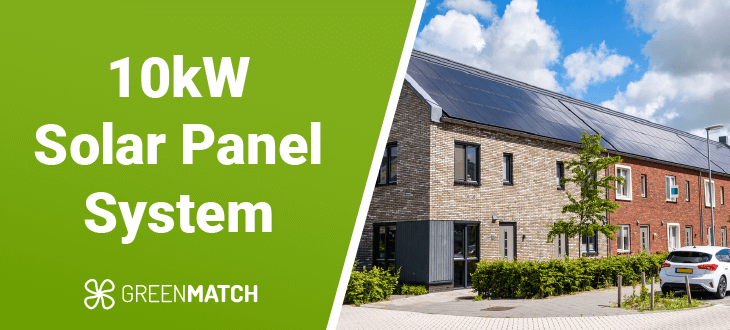
A 10kW solar system in the UK can generate electricity for large homes or smaller businesses. Large homes can benefit significantly in energy savings from having photovoltaic panels. This is because solar panels can help offset the higher energy demands of larger homes compared to smaller ones.
Solar panel systems bring many other benefits as well, such as increased property value, reducing a home’s carbon footprint, and helping you achieve energy independence.
In order to maximise these benefits, it’s important to get the correctly sized solar system for your home. Too small and you won’t be able to generate enough electricity. Too large and you’ll be overpaying for a system that will take longer to pay itself off.
In this guide, we’ll explain everything you need to know about a 10kW solar system and if it’s the right size for you. Don’t think a 10kW solar system is the right size for you? Check out our other guides:
- 2kW solar systems
- 3kW solar systems
- 4kW solar systems
- 5kW solar systems
- 6kW solar systems
- 12kW solar systems
If you’re interested in installing a solar panel system, a professional solar installer can help you figure out if a 10kW solar system is right for your home. They can advise you and offer you a tailored quote for the supply and installation of the system. To save the most money on your new solar system, we highly recommend comparing the quotes of multiple installers so that you can get a better understanding of market prices to avoid overpaying.
We can help you compare quotes from up to 4 installers. You won’t need to worry about tediously spending hours researching and checking the credentials of all of the installers in your area. Instead, you can skip to the exciting part of choosing the best MCS-certified installer for your home.
Start comparing free quotes with no obligations by clicking the button below.
- Quotes from local engineers
- Payment by finance available
- Save up to £729 per year
It only takes 30 seconds



10kW solar system costs in the UK in 2024
In 2024, the average 10kW solar system cost in the UK is £22,600. This price includes the supply of the 10kW solar panel equipment, installing and connecting to the electricity supply, and VAT (zero-rated). If you’d like to store a portion of the electricity you generate, you’ll have to take the solar battery price into account.
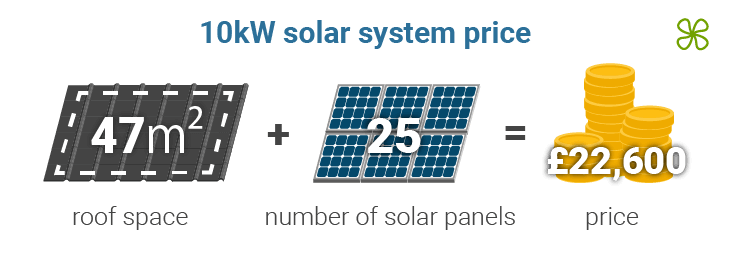
In recent years, the average solar panel cost has increased due to inflation impacting material and labour costs. Despite the price hike, homeowners continue to see financial and environmental benefits in solar energy with 60% more homeowners installing solar panels than last year.
To help you understand the scope of that increase, it means that in 2023 almost 60,000 new solar panel installations are expected. In the next section, we’ll weigh up the pros and cons with you to help you understand why so many UK homeowners are making the switch to a solar panel 10kW system.
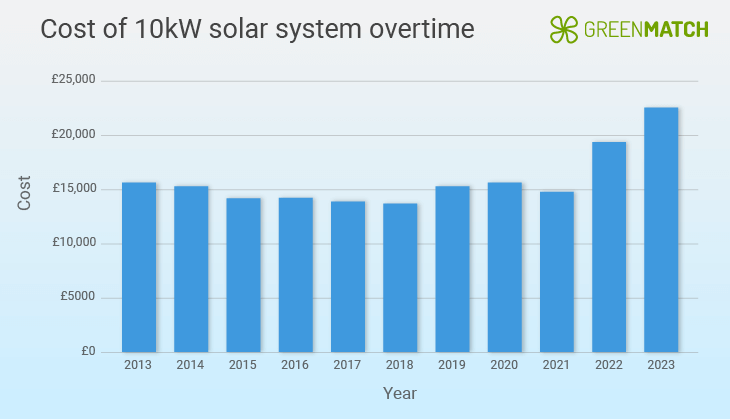
Pros and cons of a 10kW solar system
Similar to all home improvement and domestic energy systems, there are pros and cons. A 10kW solar panel system is a rather large system, so there’s a lot to consider, such as cost, space, environmental footprint, maintenance, solar panel efficiency, and more.
Many homeowners across the UK agree the advantages outweigh any disadvantages – as seen in the increasing number of new solar panel installations every year. But don’t just take our word for it – In this section, we’ll objectively weigh up the pros and cons so you can make the decision yourself.
Advantages of a 10kW solar system
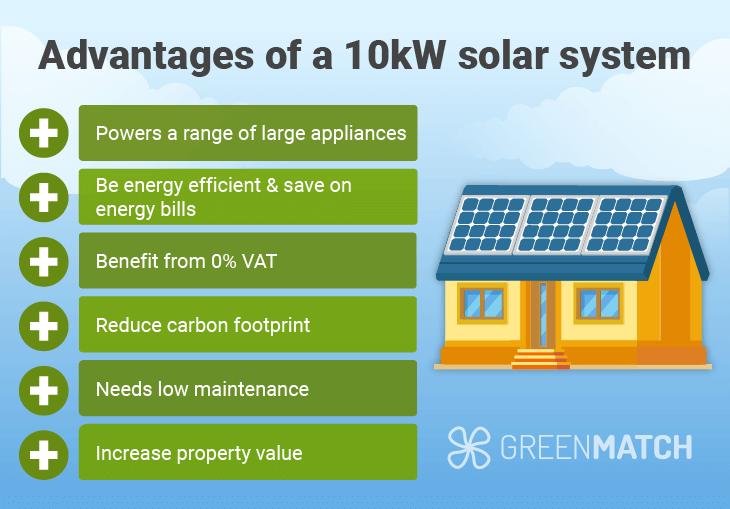
1. 10kW solar systems can power a range of large appliances.
A 10kW solar panel system can power a wide range of appliances from common ones like lighting, refrigerators, and washing machines, to larger appliances like an electric vehicle charger, air conditioning, and even a heat pump. Smaller solar panel systems may struggle to power these large appliances comfortably.
The exact number of appliances and devices that a 10kW solar system can power will depend on a number of factors, such as the efficiency of the appliances and devices, the amount of sunlight that the solar panels receive, and the time of year.
2. Become more energy independent and save on annual energy bills.
In recent years, we’ve seen how easily energy prices can fluctuate. By switching to a 10kW solar system, we estimate you can save as much as £5,000 a year on electricity costs alone. That savings figure doesn’t even include the money you could earn from exporting electricity back to the National Grid. This is all because you’re generating electricity at no cost from a renewable source: the sun.
3. Benefit from 0% VAT on energy-saving products.
To encourage the uptake of renewable and low-carbon systems, the UK Government has introduced a VAT reduction. That means, until March 2027, you will pay 0% VAT for the supply and installation of any domestic solar PV system in the UK. A typical family installing rooftop solar panels will save more than £1,000 in total on installation. This cost reduction will happen automatically when you install through an MCS-certified installer.
4. Reduce your home’s carbon footprint.
It’s a common misconception that electricity from the grid is always environmentally friendlier than gas, but that’s not always the case. However, by generating your own electricity via solar panels, you can ensure you’re generating clean, renewable electricity. We estimate you’d save as much as 3,600 kilograms of CO2 from entering the atmosphere by switching to solar energy. That’s equivalent to the carbon emissions of driving 14,800 kilometres (9,200 miles)!
5. 10kW solar systems need low maintenance.
Even with a large solar system, maintenance is minimal, requiring only regular panel cleaning and yearly inspections. Although larger systems involve more panels to monitor, the added maintenance is not proportional, making it a practical choice.
6. Solar panels increase property value.
Studies by Solar Energy UK and Zillow found that solar panels can increase your property value by 2% and 4%, respectively. With increased property value from solar panels, you benefit from a higher resale value, a competitive advantage when selling, and improved equity for loans, mortgages and other financial purposes.
Disadvantages of a 10kW solar system
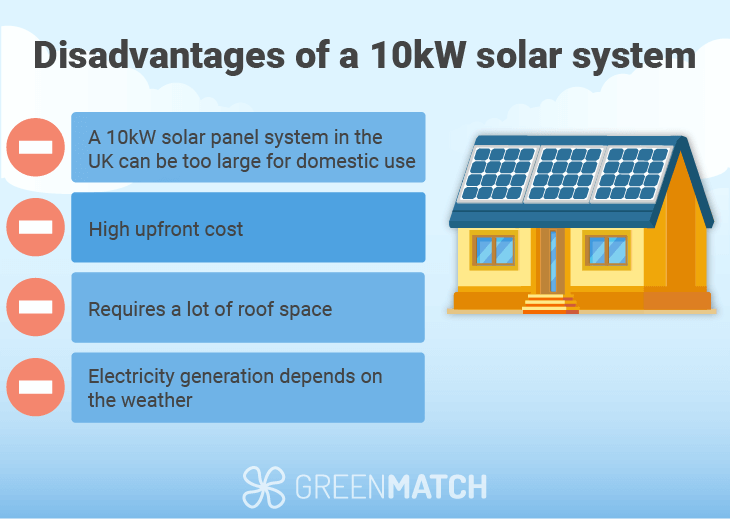
1. A 10kW solar panel system in the UK can be too large for domestic use.
Depending on how much electricity your household uses on a daily and annual basis, solar panels in a 10kW system may be too large. Even if you store the excess electricity in a battery or export the excess electricity back to the grid, you’ll still need to invest in this large domestic system.
Read more about finding out how big of a solar system you need in our guide.
2. High upfront cost.
We’ve mentioned earlier that a 10kW solar system price tag sits at around £22,600. That’s not even considering the cost of a 10kW solar system with battery storage. The cost of solar batteries like the Tesla Powerwall price is something to consider. For more comprehensive prices, you can check our dedicated pages with reviews of the best solar battery systems.
While you get more value for your money by choosing a larger solar system, it doesn’t change the fact that you’ll need to invest a lot of money upfront before the solar panel system begins to pay itself back. The good news is there are ways to help offset the cost. One of the best ways is to look into grants for solar panels.
3. Requires a lot of roof space.
A common question from homeowners that we answer is “How many panels are in a 10kW solar system?”. While it depends on the size of each solar panel, you can expect anywhere between 25 and 40 panels.
That translates to needing between 47m2 and 76m2 of roof space. It’s common that the average family’s home won’t have the required roof space, so it’s important to review your building plans and consult a solar installer first.
4. Electricity generation depends on the weather.
The electricity you probably get right now from the National Grid comes reliably and whenever you need it. Generating your own electricity via solar panels is a bit different because you rely on sunlight that only comes during the day. The amount of sunlight your panels receive can change significantly depending on the day/season, which means it is possible to not generate enough electricity to meet your demand.
To solve this, you can add a solar battery to your system. A battery will store the energy you generate to be used later, including on a cloudy day or during a power outage.
Solar panels for a 10kW system aren’t a fit for all households, but luckily there are different kilowatt system size options to choose from. A professional solar installer is your best bet for navigating these options and installing them. A professional can offer advice specific for your home and can take you through both the solar panel installation and testing steps. Not only that, but you’ll receive a tailored quote so you have full clarity when it comes to the cost.
It’s a smart move to compare multiple quotes because it gives you a clear picture of what’s available in the market and you can find the best deal that fits your budget. With GreenMatch, you easily get up to 4 comparison quotes with none of the hassle of checking credentials. You can rest assured that all of the quotes you receive are from MCS-certified installers.
Start getting free, no-obligation comparison quotes by clicking the button below. It’s the best way to make sure you get the solar solution that’s just right for your home.
- Quotes from local engineers
- Payment by finance available
- Save up to £729 per year
It only takes 30 seconds



10kW solar system savings in the UK
A 10kW solar system has the potential to save you a significant amount of money every year and eventually profit you money after paying it off. We estimate that you can save as much as £5,000 a year by generating your own electricity via solar panels instead of importing from the grid. We’ve broken down the energy generated and money saved in the table below.
| Time period | Energy produced (kWh)* | Average energy cost savings |
|---|---|---|
| Daily | 44kWh | £14 |
| Monthly | 1,320kWh | £412 |
| Annually | 16,060kWh | £5,011 |
These savings are significant, especially when you consider the average cost of a 10kW solar panel system is £22,600. Based on this data, this means your payback period (the point in which your solar panels pay for themselves), could be reached within 5 years!
Chances are that you may not even use all of the electricity you generate. So you could also additionally profit from exporting electricity back to the National Grid. In 2024, the best SEG rate you could sell electricity for is 29.3p/kWh.
That means, if you sold 5% of the electricity you generated in a year, you could earn up to £235. Similarly, 10% of electricity would earn up to £471.
If you have a large home, many children, or several high-electricity using devices a larger rooftop PV system may be necessary. Examples would include if you have one or more electric vehicles and you are using solar electricity for your transportation. Lastly, when you add heat pumps (which use electricity to efficiently provide your heating needs) you can easily double your electricity needs and will need a larger PV system. In some regions, solar reduces the cost of electricity and they can make heating with a heat pump economical .

Joshua M. Pearce is the John M. Thompson Chair in Information Technology and Innovation. He holds appointments at Ivey Business Schooland the Department of Electrical & Computer Engineering at Western University. He runs the Free Appropriate Sustainability Technology research group.
How much does a 10kW solar system produce per day?
On an average day in the UK with 4.4 hours of sunlight (based on national data), you can expect your 10kW solar panel system to generate a total of 44kW. Based on typical daily electricity use of a home in the UK, this is above average. For reference, a home with 4 to 5 people typically uses 11.2kW of electricity in a day. That means a 10kW solar system could technically provide enough electricity for 3 to 4 homes.
10kW solar system: Solar panels with battery storage in the UK
Many homeowners in the UK are recognising the enhanced potential of solar panel systems when paired with a solar battery. By integrating a 10kW solar system with battery storage, homeowners can significantly increase their energy independence and reduce their reliance on the grid.
Typically, solar systems without battery storage are susceptible to reduced energy generation based on fluctuations in weather conditions –for example, on overcast or rainy days. However, by equipping a 10kW solar system with batteries, you could store excess energy generated during sunny periods to use when sunlight is low.
A 10kW solar system with battery backup in the UK means you can reliably have a continuous power supply regardless of the weather or power outages. However, you do need to consider the additional cost of a solar battery. The good news is that if you’re concerned about the costs, your solar battery doesn’t need to be installed alongside your solar panel system.
Still curious about solar batteries? Here’s a video which explains everything you need to know about solar batteries before taking the dive. Also, try reading our guide on solar batteries.

Is a 10kW solar system with a battery worth it for your UK household?
Possibly, but determining if a 10kW solar system with a battery is worth it for your UK household involves careful consideration of several factors. First and foremost, assess your financial readiness. Start-up costs can be a significant hurdle, so evaluating your budget and exploring available financing options is crucial. Fortunately, there are solar grants and financial schemes available in the UK.
Here’s a list of questions to ask yourself when determining if a 10kW solar system with a battery is worth it for your home:
- Is a 10kW solar system appropriately sized for my energy demands?
- How much sunlight does my rooftop receive?
- Is my roof suitable for solar panels?
- Have I obtained multiple quotes from reputable installers?
If you think your home is suitable for and can benefit from a 10kW solar system, here’s what you can expect in the years after installing the solar panels.
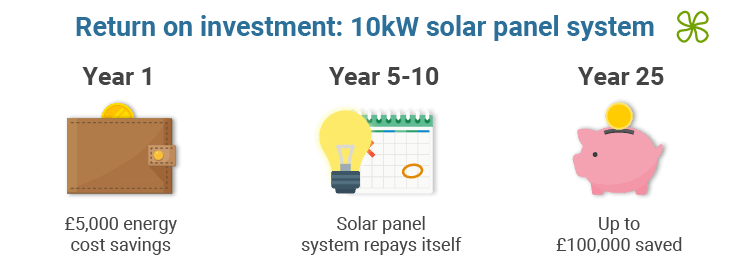
The guiding questions provided in this section are just the tip of the iceberg. A professional solar panel installer can run through a complete checklist with you to help you optimise the benefits of solar energy while minimising any risks. It’s important to choose a reputable and certified solar professional, otherwise, you increase the risk of a poor installation.
While it can take hours, or even days, to research and verify the credentials of solar professionals, all of the installers within GreenMatch’s network are MCS-certified. You can easily get access to up to 4 of these solar installers who will offer you tailored quotes for free. Just click the button below to start getting these free, no-obligation quotes.
- Quotes from local engineers
- Payment by finance available
- Save up to £729 per year
It only takes 30 seconds



FAQ

As a writer with a deep understanding of low-carbon energy systems, Hannah aims to breakdown knowledge barriers and share insights to empower individuals in their pursuit of creating more environmentally conscious homes.
 We strive to connect our customers with the right product and supplier. Would you like to be part of GreenMatch?
We strive to connect our customers with the right product and supplier. Would you like to be part of GreenMatch? 